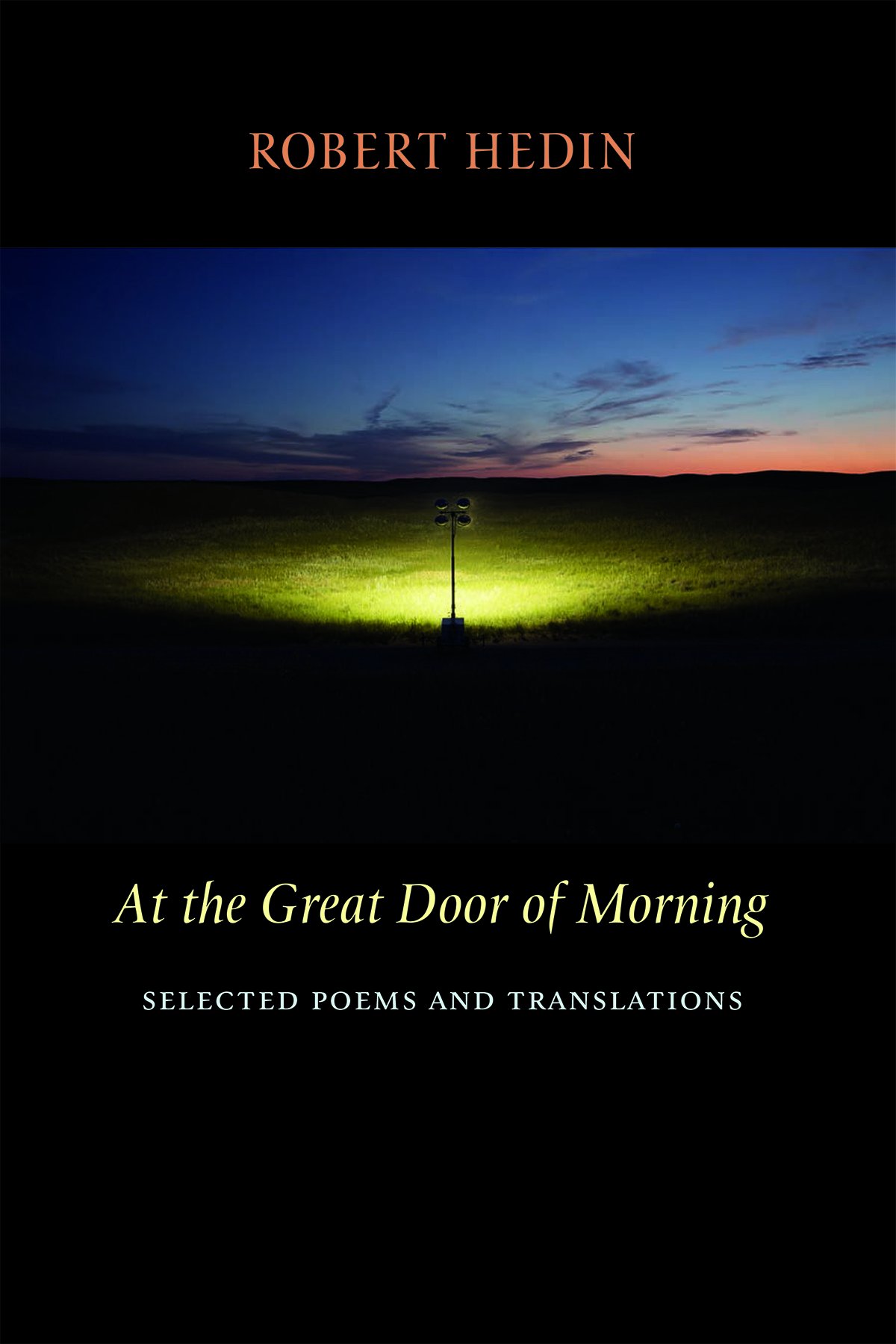At the Great Door of Morning: Selected Poems and Translations
by Robert Hedin
reviewed by Jason Tandon
Born in Red Wing, Minnesota, in 1949, Robert Hedin has published eight full-length collections of poetry, beginning with Snow Country in 1975. He is a contemporary of Tom Hennen, another Minnesotan poet, and together they make up a small coterie for whom Robert Bly is the elder statesman and primary American influence. While neither Hedin nor Hennen is as politically or socially engaged as Bly, each exhibits qualities of Bly’s “deep image” aesthetic, including the use of natural-world phenomena to convey a solitary speaker’s inner state.
Hennen’s poetry also shares a similarity with another Midwestern poet, Ted Kooser (who writes a laudatory foreword to At the Great Door of Morning), which is an inclination to transform everyday objects and experiences through metaphor, especially at the ends of poems. Here is an early poem from Hedin entitled “An Hour Ago” that could have been written by Kooser himself:
In the small dusty
Galaxy of the garden,Where the hydrangeas
Are all bright blueAnd bask like planets
In the morning light,I could hear Bashō
Hard at work, hoeing.
In another example of Hedin’s use of concluding metaphor, “My Mother Turns Ninety,” the final quatrain reads: “ … everything now is tired / Of climbing, even the smoke rising / in great strides over the rooftops / Wants to lie down at rest with the rain.” While one can imagine other poets presenting this subject through a narrative of hospital stays or debilitating illnesses, Hedin’s speaker embodies a Zen-like acceptance.
One might argue that Hedin’s metaphoric approach sanitizes painful or tragic subjects. In “Der Führer’s Mercedes,” the speaker recalls Hitler’s car on a “tour of the heartland.” He then admits, “You understand I was young, / I knew nothing. / Göring, Goebbels, / their names were years away,” and ends with the effect the exhibition had on him:
… All day I kept seeing
its long thundering shadowcoming down hard,
the dust and dead leaves
it pulled into the morning air.
Phrases such as “thundering shadow” and “coming down hard” show some awareness of the devastating power of Hitler’s regime, as does the word “morning” and its implied homophone “mourning.” But the liquid and aspirate sounds in the final two lines create a tranquil, euphonic ending, and the upward movement of “dust” and “dead leaves,” though mitigated by the somewhat violent “pulled,” diminish the horror of historical events.
Hedin’s personas, even when troubled, rarely exhibit anxious or depressed outlooks. The tone of his poems is calm, deferential. Readers looking for impassioned engagement with race, gender, or social justice will not find them in this book, populated with titles such as “Rain,” “Pollen,” “Rowboats,” and “The Old Swede’s Feet.” The book’s final section, entitled “Field Notes,” presents sixteen aphorisms in which Hedin defines poetry as “generous” and “liberating,” as having the power to break through “the numbing, stultifying voice of our mass culture to successfully articulate … a deeper circuitry that helps give life its necessary shape and substance.” “Like religion,” Hedin posits, “[poetry] journeys toward communion,” a sentiment which explains his non-provocative choices of diction and subject.
In At the Great Door of Morning, Hedin also gives us excellent translations of two of Norway’s most critically acclaimed modern poets, Rolf Jacobsen and Olav H. Hauge, and introduces American readers to Dag T. Straumsvåg, a contemporary Norwegian prose poet. Hedin has previously published translations of Jacobsen in The Roads Have Come to an End Now (Copper Canyon, 2001) and of Hauge in The Dream We Carry (Copper Canyon, 2008)—both books I highly recommend.
Straumsvåg’s prose poems begin with realistic, even prosaic, characters and settings that suggest the possibility of a logical narrative, then veer into the absurd. The tone ranges from deadpan to menacing, giving the impression of satire—though what precisely is being satirized remains elusive. Alluring, unsettling, and above all entertaining, these brief paragraphs encourage instant rereadings, and Hedin’s preservation of Straumsvåg’s imaginative play is remarkable:
I like to think of the prose poem as an explorer setting sail for the open sea. … After a few months, the sailors are all homesick and stricken with scurvy, a sinking feeling they have wasted their lives. It’s more likely then the prose poem is a case of vodka hidden away in the engine room of the Titanic, used as a card table by the machinists after a long, hard watch, all of them hungry for action, for something unexpected to happen— … some excitement at least, a drink while counting their losses.
On the quality and generous offering of the translations alone, I wholeheartedly recommend At the Great Door of Morning, and Hedin’s own selected poems are a natural complement.
Published on September 5, 2017

